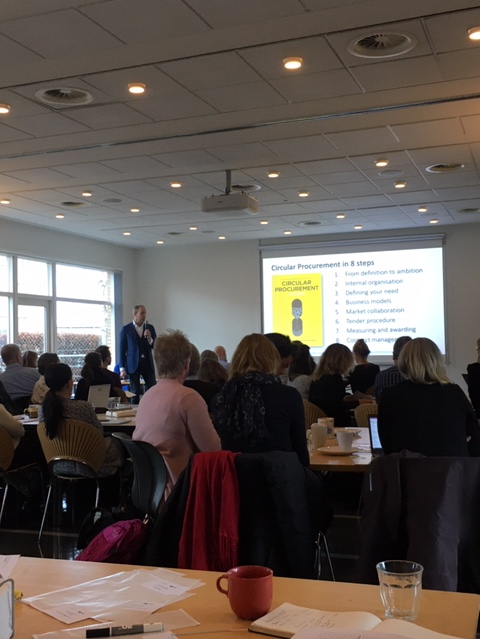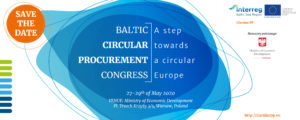The first national seminar for procurers and procurement managers in Denmark was held in Roskilde on January 30th 2020. The seminar was held in collaboration with City of Aalborg, Aalborg University, Gate21, The Danish Environmental Protection Agency (POGI/FORUM) and KTC (Municipal Technical Association in Denmark). There were around 60 participants for the seminar, where the participants were a mix of purchasers and expert in environment issues and waste mainly from eastern Denmark.
Presentations
The seminar began with a presentation by Strategic advisor on circular procurement, Joan Plummer from Rijkswaterstaat (the Netherlands). He introduced the concept of “circular procurement in 8 steps” http://circularpp.eu/new-book-about-circular-procurement/ . Afterwards, Emma Borjeson from City of Malmo and Tor Sjodin from SoEco presented the case of “non new furniture” – City of Malmos circular pilots tender in CircularPP-project. http://circularpp.eu/malmos-circular-purchase-agreement-for-not-new-office-furniture/ . Two thematic presentations followed: 1) emission-free construction sites present by Harald Aas from Nasjonalt program for leverandørutvikling in Norway and 2) sustainable use of single used plastic present by Inge Werther from Niras in Denmark.
Alberto Huerta from Aalborg University offered an opportunity to the participants to schedule a meeting in order to discuss further their current or potential circular procurement projects
Workshop
After lunch was held the sprint workshop divided in 4 product tracks: Plastic, furniture, construction and textile. Birgitte Krebs Schleemann from City of Aalborg led the furniture workshop for 13 participants. The case selected was about an upcoming circular tender on furniture for the primary schools in a municipality where new and old furniture have to be included, some counseling about decoration learning environment and employees on the edge of the labor market must also be taken into consideration. The sprinter workshop was divided into 5 questions about a circular tender: The big why, what benefits it will entail, the mail interest to be involved, an activity plan for market engagement etc. and the budget not only the finances but alto the CO2 emission, job creation etc. The participants were very active and had many good inputs.



